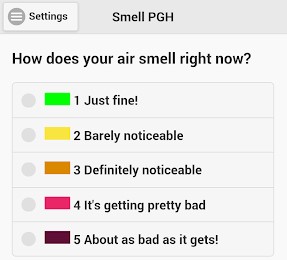Blog

Breathing in the ‘Burgh, Part III: What Can We Do to Help?
Pittsburgh struggles with air quality, having ranked 10th worst out for daily measure of fine particulate pollution by the American Lung Association in 2019, and we regularly note air quality warnings during weather broadcasts and see reports of air quality in the news. We even have a local organization, the Breathe Project, which is dedicated to helping the public understand the quality of the air we breathe, engage and take action. What do all of the metrics they discuss even mean? And is there anything we can do to help our internationally-recognized awesome city and the environment around it? Explore in our new multi-part series!
Over the past two weeks, we’ve talked about the air quality problem in our region and how it threatens our health and the health of our environment, but what can we actually do to help?
Transportation is a common pollution source, and we can certainly advocate for and use public transportation and bike-safe streets whenever possible. A number of organizations in the city (like Breathe Project and GASP) are also paying close attention to pollution sources, and you can become more involved. You can also monitor your home quality by checking out a Speck air quality meter at many of the Carnegie Libraries in Pittsburgh.
Phipps offers its own resource, Easy Steps with Big Impact for Climate Change, that is designed to help you take action at home — and many of the same steps that positively address climate change also help to mitigate air pollution! Here’s a sample of just a few of steps you can take:
- Switching to a renewable energy source like solar or wind allows you to power your home without the emissions impact of fossil fuels.
-
Planting low-maintenance trees that grow fast and live long is excellent for carbon sequestration, and strategic placement of trees around your home can help reduce your cooling needs.
-
Driving the most energy-efficent car you can. Electric cars are best, but there are fuel efficiencies to consider at every price point.
From the Breathe Project website, additional suggestions include:
-
Selecting household cleaners that are water-based or have low amounts of volatile organic compounds to avoid indoor air pollution.
-
Changing your car’s air filter and oil regularly.
-
Using less water, since letting your faucet run for five minutes uses about as much energy as letting a 60-watt light bulb run for 14 hours, according to the EPA.

Phipps Wellness and Sustainability Specialist Meghan Scanlon also has an easy but distinctively impactful suggestion: the Smell PGH app for your phone. The app crowd-sources air quality data by recording when you notice foul smells outside.
“By using the Smell PGH app created by the Carnegie Mellon University CREATE Lab,” Meghan says, “You can help send a message to the Allegheny County Health Department about the pollution we experience. The app is incredibly simple to use. It geotags your feedback so regulators know where the smells are strongest. Pairing these reports with wind patterns and other meteorological data, regulators can identify pollution sources.”
The app is a great example of how we can continue to grow as technological society, but not at the expense of human and environmental health.
“Progress does not need to be at the expense of the environment,” Meghan notes. “We shouldn’t have to give up our health to grow our economy.”
And we won’t. Pittsburgh’s community is strong, and neighbors care about each other. Air quality is problem, but no problem is too big for our city.
What’s next, you ask? Get involved! The Breathe Project has a list of all community organizations in Pittsburgh and around the area who will help you gather together to make a difference.
And speaking of gathering, the 2020 One Health One Planet™ symposium, scheduled for next March, will bring together experts from healthcare, environmental, veterinary and other disciplines to discuss the latest insights on air quality and the challenges it presents. Organizational leaders, M.D.s, D.V.M.s, public health specialists, ecologists, scientists, researchers, students and anyone who is interested in exploring the intersection of human and environmental health are invited to attend. Stay tuned for details!

